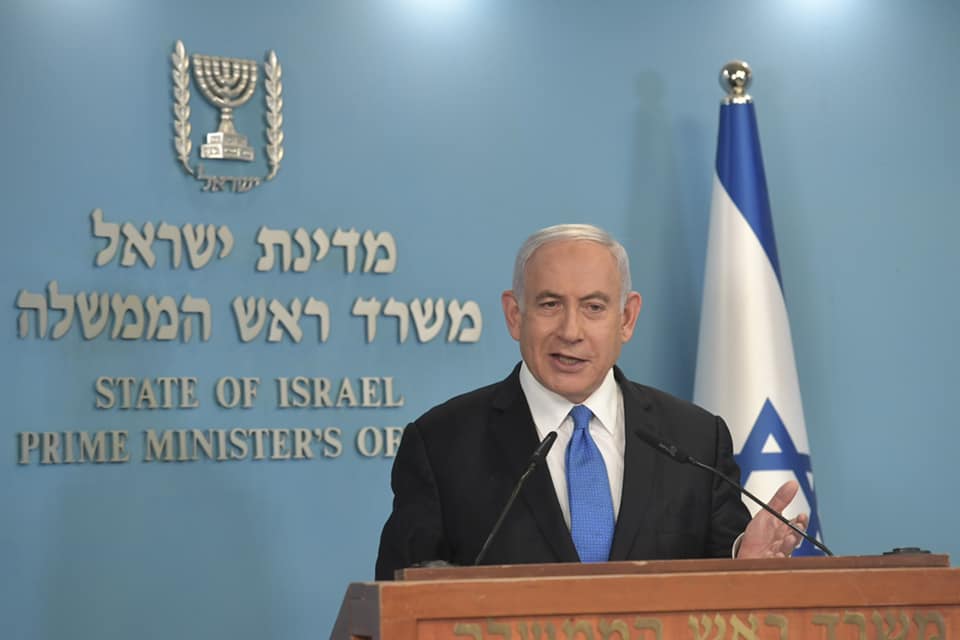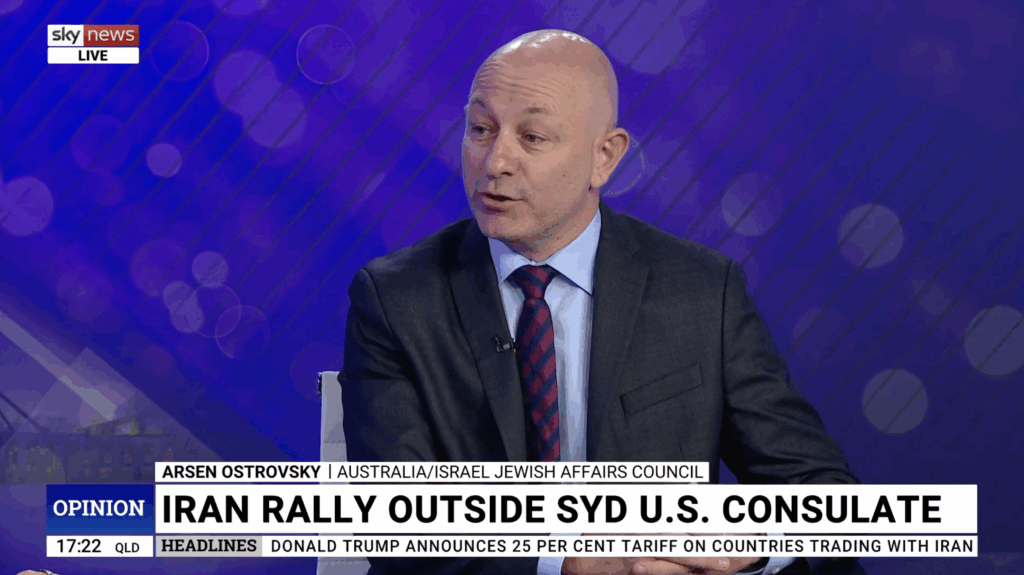IN THE MEDIA
The Bibi years: Triumphs, tribulations, controversies and contradictions
June 17, 2021 | Ahron Shapiro

This article was originally published in The Australian Jewish News – 18 June 2021.
With a simple vote of 60-59 on June 13, the Knesset has pushed the Likud and its leader Benjamin Netanyahu into opposition for the first time since 2009 and potentially brought to a close Israel’s Netanyahu era – but not for sure.
While Netanyahu has vowed to fight the new government as head of the Opposition, it is uncertain whether he would be returned as Likud leader in the event of new primaries. As such, it would be appropriate to reflect on the indelible mark Netanyahu has made on Israel thus far, while also briefly consider the changes in store under a unity government led under a rotation arrangement between Yamina’s Naftali Bennett and Yesh Atid’s Yair Lapid.
This is neither the time nor place to dwell on the corruption charges Netanyahu is currently fighting which are months or even years away from coming to a verdict. In the end, Netanyahu lost his parliamentary majority. How it happened is less important than the fact that it has happened, as is the lot of all democratic politicians who stay in the politics game for too long.
The most ambitious and successful of Likud’s “princes”, that is, second-generation right-wing leaders that included Benny Begin, Ehud Olmert and Tzipi Livni, Netanyahu distinguished himself as a media-savvy performer, parlaying a successful run as Israel’s UN ambassador between 1984 and 1988 into an appointment as deputy foreign minister under Moshe Arens and David Levy.
Netanyahu beat Begin and Levy in a vote for the Likud leadership months before the 1993 Oslo Accords. His fierce criticism of the deal, as well as Yitzhak Rabin’s government that legitimised the Palestine Liberation Organisation and negotiated it, helped Netanyahu edge past Rabin in head-to-head polls into mid-1995 under the shadow of increasing terrorism.
Nevertheless, Netanyahu’s first term as prime minister was unexpected, his political brand having been tainted by accusations he had turned a blind eye to incitement in the months leading up to Rabin’s assassination in November 1995. While Rabin’s successor, Peres, had at one stage led Netanyahu by 20 points in the polls, a renewed wave of terrorism in late winter saw a revival of Netanyahu’s fortunes, and he beat Peres in May 1996 by less than one per cent in a direct ballot.
While Netanyahu had beaten Peres under a slogan of “making a secure peace”, and pursuing “reciprocity” in concessions with the Palestinians, he soon suffered politically, alienating right- wing and left-wing voters alike, and was soundly beaten by his former commander in [the elite commando unit] Sayeret Matkal, Ehud Barak, in 1999.
Netanyahu stepped back, returning as foreign minister, then finance minister under Barak’s successor Ariel Sharon. It was in the latter role – one he stepped into while Israel was suffering a crippling recession aggravated by the Second Intifada – that Netanyahu reformed and transformed Israel’s economy, instituting policies that saw the country experience tremendous growth and stability, albeit at the cost of weakening the welfare state.
Israel’s reputation as the “startup nation” was partially driven by Netanyahu’s focus on that sector, and it provided Israel with dividends in spades. Between 2010 and 2020, funding for Israeli entrepreneurs increased by 400 per cent.
Netanyahu served in opposition between 2006 and 2009, picking up the pieces of the Likud, which had sunk to a nadir of 12 Knesset seats in the aftermath of Sharon’s split to form Kadima over the Gaza disengagement.
Meanwhile, Hamas’s takeover of Gaza, kidnapping of Gilad Shalit, and persistent rocket barrages leading to the Gaza War of 2008 eroded Israeli support for Kadima’s ideas of unilateral withdrawal, while Sharon’s successor Olmert was forced to resign over corruption charges stemming from his time as Jerusalem’s mayor.
A revealing footnote to Likud’s political comeback under Netanyahu in the 2009 election is that Kadima under Olmert’s successor Livni had received one more seat than Likud in the general election and, it was later revealed, was offered a rotation as PM, which Livni declined, forcing Netanyahu’s hand in forming a religious-right coalition plus Labour.
In fact, contrary to his identification with the right wing, Netanyahu’s governing preferences from 2009 forward would be to partner with centre and centre-left elements whenever possible. Examples of this include Barak’s Labour and Independence parties (2009-2013), Kadima (May-July 2012), Livni’s Hatnuah and Lapid’s Yesh Atid (2013-2015), Moshe Kahlon’s Kulanu (2015-2020), and Amir Peretz’s Labour (2020-21).
At a speech at Bar Ilan University in 2009, Netanyahu became the second Likud prime minister after Sharon to endorse a demilitarised Palestinian state. (In case you’re wondering, Bennett has quietly followed, explicitly supporting the creation of a Palestinian state in the context of his conditional support for the Trump peace plan in an article for Newsweek in 2020.)
Netanyahu also fashioned himself as a champion of Israel’s West Bank settlement movement. The truth is more complex. He agreed to a unilateral 10-month freeze in 2010, instituted the occasional unannounced silent freezes in the years that followed, and generally allowed fewer housing starts on average than his predecessors, at a pace that failed to even meet the demand created by natural population growth.
Netanyahu also kept most settlement growth confined to the settlement blocs, failed to act to relocate the Bedouin political settlement of Khan al-Ahmar near Jerusalem despite Supreme Court support, and backtracked on a plan to apply Israeli law to settlements in the Jordan Valley.
His relationship with Israel’s Arab community has similarly been full of contradictions, confounding those who would attempt to categorise him as broadly anti-Arab.
Lack of effective policing in Arab villages and cities and recent mob violence against Jews in mixed cities like Akko and Lod, and by some Negev Bedouin, betray some policy failures. Netanyahu has also been rightly criticised in the past for exploiting fears of radical Arab politicians to motivate his right- wing base to vote, as he did in 2015, or helping a supporter of the late racist demagogue Rabbi Meir Kahane get into parliament for the sake of securing a few right-wing votes, as he did ahead of the most recent election.
At the same time, the fact that the Likud Arab vote climbed by up to 1352 per cent in Arab locales compared to last year’s election, pushing Likud’s Arab vote totals higher than any other Zionist party, shows that he must have been doing something right. Many may be surprised to learn that in 2016, Netanyahu’s government approved an investment of some 10 billion shekels ($A4 billion) into improving the Arab sector – a massive infusion of capital that dwarfs the efforts of any previous Israeli government. Under Netanyahu, the Israeli Arab middle class has expanded, while they have also benefited from the Abraham Accords inspired by Netanyahu that are making it easier for Arabs with Israeli citizenship to travel and do business with the broader Arab world.
And there is no doubt, those Abraham Accords – the expanding circle of Arab or Muslim countries pursuing peace and normalisation with Israel – are Netanyahu’s crowning achievement. They represent the fulfilment of Netanyahu’s fervent belief that forging ties with Israel’s regional neighbours is not only an Israeli strategic interest, but will make peacemaking with the Palestinians easier. Netanyahu also deserves much credit for improving Israel’s relations with many countries in Asia, eastern Europe, South America and Africa.
Netanyahu’s overall handling of Israel’s relationship with its most important ally and sponsor, the United States, has been less successful. In hindsight, his decision to make his disagreements with an already disagreeable president Barack Obama over nuclear negotiations with Iran a public battle, to the point of challenging the president’s policies in a speech before a Congress, ultimately failed to bring about a better deal and probably accelerated the erosion of Israel’s support within the left flank of the Democratic Party, as certainly did his bear hug of president Donald Trump and the Republican Party in the later part of the last decade.
And while it’s true that Netanyahu’s Iran strategy did have its day in the sun when the Trump administration adopted a policy of applying maximum sanctions pressure to renegotiate and fix the fatal flaws in the 2015 nuclear deal, alarmingly the Biden Administration appears poised to undo this pressure without getting anything new in return. And equally worrying, we are now seeing less bipartisan support in Congress pushing back against Iran than in 2015.
On the other hand, most negotiators involved at the time agree that Netanyahu bent over back- wards for the Obama administration in his pursuit of peace with the Palestinians, certainly did not deserve blame for its failures, and should have been given more credit generally for restraining set- dement activity.
So, where does that leave Israel now that Netanyahu has vacated the prime minister’s residence on Jerusalem’s Balfour Street? The new government is, on one hand, inherently unstable, given its com- position of eight wildly disparate parties, including Mansour Abbas’s Islamist and patently non-Zionist Ra’am party. Yet on the other hand, none of the parties are interested in precipitating new elections anytime soon.
Despite accusations of betrayal coming from Netanyahu, the ultra-Orthodox and the Israeli right, Bennett going first in the rotation creates an ideological bridge that may ease the transition between Netanyahu and Lapid’s greatly different personalities in due time.
Bennett, who like Netanyahu has a military background, a strong ability to communicate and comes from a right-wing world view, lacks Netanyahu’s baggage, and the realities of a unity government will give him the cover and freedom, as he said in his televised statement on May 30, to place ideology on a shelf and “focus on what can be done, instead of arguing over what is impossible”.
Out of necessity, coalition guidelines are geared towards governance by consensus, and every faction will have the ability to challenge legislation it finds objectionable. In practice, that means the new government will only be able to pass non-controversial laws and pursue centrist, pragmatic and middle-of-the road policies.
“This is not a government that will disengage, nor will it hand over territories, nor will it be afraid to launch a military operation, if required,” Bennett said. “The political context will not stop any- thing. Each side has equal voting power, and each side has a veto. You can relax.”
Photo credit: Facebook page of Binyamin Netanyahu
Tags: Binyamin Netanyahu, Israel, Naftali Bennett





